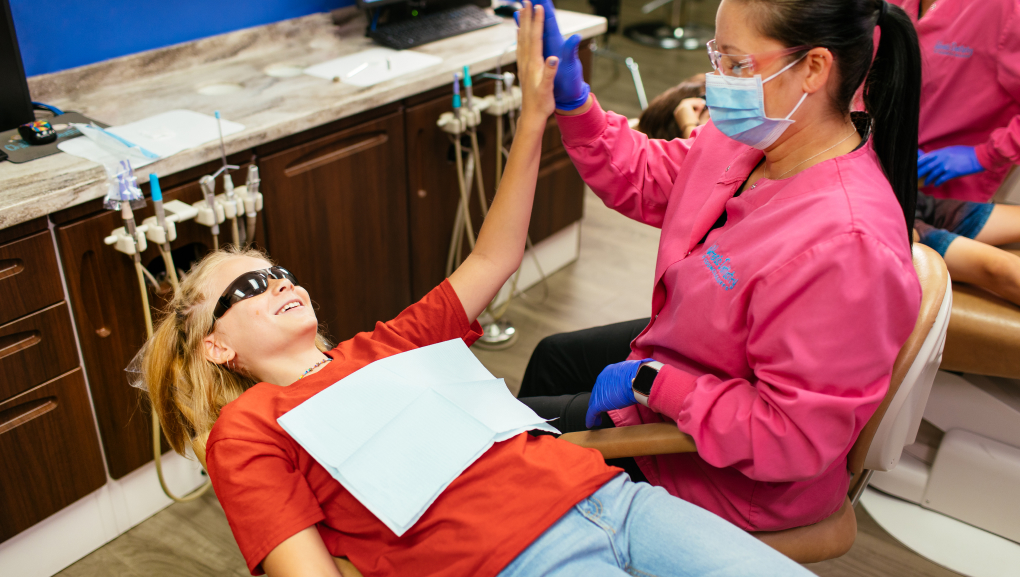
New Patients
Children’s Dentistry of Council Bluffs is always happy to add more members to our family. Whether it’s your child’s first dental appointment or you are simply changing practices, our office will go out of our way to make sure you all feel welcome. A good dentist can make a world of difference in your child’s life. Come and see what sets us apart.
Request an AppointmentMake A Payment
Children's Dentistry of Council Bluffs now offers our patients the convenience of online payments. Just click below to get started.
Make A Payment
First Visit
Our office, as well as the American Academy of Pediatrics (AAP), the American Dental Association (ADA), and the American Academy of Pediatric Dentistry (AAPD) all recommend establishing a "Dental Home" for your child by one year of age. Children who have a dental home are more likely to receive appropriate preventive and routine oral health care.
You can make the first visit to the dentist enjoyable and positive. If old enough, your child should be informed of the visit and told that the dentist and their staff will explain all procedures and answer any questions. The less to-do concerning the visit, the better.
It is best if you refrain from using words around your child that might cause unnecessary fear, such as "needle", "shot", "pull", "drill" or "hurt". The office practices using words that convey the same message but are pleasant and non-frightening to the child.
Contact Us Today
Patient Forms
The Dental Home:A Place for Parents
We invite you to stay with your child during the initial examination. During future appointments, we suggest you allow your child to accompany our staff through the dental experience. We can usually establish a closer rapport with your child when you are not present. Our purpose is to gain your child's confidence and overcome apprehension. For the safety and privacy of all patients, other children who are not being treated should remain in the reception room with a supervising adult.
We strive to make every visit to our office a fun experience for everyone!
Contact Us Today
Office Info
How are Appointments Scheduled?
The office attempts to schedule appointments at your convenience and when time is available. Preschool children should be seen in the morning because they are fresher, and we can work more slowly with them for their comfort. Schoolchildren with a lot of work to do should be seen in the morning for the same reason. Dental appointments are an excused absence. Missing school can be kept to a minimum when regular dental care is continued.
Since appointed times are reserved exclusively for each patient, we ask that you please notify our office 24 hours in advance of your scheduled appointment time if you are unable to keep your appointment. Another patient, who needs our care, could be scheduled if we have sufficient time to notify them. We realize that unexpected things can happen, but we ask for your assistance in this regard.
What About Finances?
Payment for professional services is due at the time dental treatment is provided. Every effort will be made to provide a treatment plan which fits your timetable and budget and gives your child the best possible care. We accept cash, personal checks, debit cards and most major credit cards.
Do we take Medicaid?
We accept Iowa Medicaid for children up to age seven. Currently we're unable to accept Medicaid from states other than Iowa. For Private insurances we accept children up to age 11. Please don't hesitate to reach out if you have any questions about your specific insurance coverage.
Our Office Policy Regarding Dental Insurance
If we have received all your insurance information on the day of the appointment, we will be happy to file your claim for you. You must be familiar with your insurance benefits, as we will collect from you the estimated amount insurance is not expected to pay. By law your insurance company is required to pay each claim within 30 days of receipt. We file all insurance electronically, so your insurance company will receive each claim within days of the treatment. You are responsible for any balance on your account after 30 days, whether insurance has paid or not. If you have not paid your balance within 60 days a re-billing fee of 1.5% will be added to your account each month until it is paid. We will be glad to send a refund to you if your insurance pays us.
PLEASE UNDERSTAND that we file dental insurance as a courtesy to our patients. We do not have a contract with your insurance company, only you do. We are not responsible for how your insurance company handles its claims or for what benefits they pay on a claim. We can only assist you in estimating your portion of the cost of treatment. We at no time guarantee what your insurance will or will not do with each claim. We also cannot be responsible for any errors in filing your insurance. Once again, we file claims as a courtesy to you.
Dental insurance is meant to be an aid in receiving dental care. Many patients think that their insurance pays 90%-100% of all dental fees. This is not true! Most plans only pay between 50%-80% of the average total fee. Some pay more, some pay less. The percentage paid is usually determined by how much you or your employer has paid for coverage, or the type of contract your employer has set up with the insurance company.
You may have noticed that sometimes your dental insurer reimburses you or the dentist at a lower rate than the dentist's actual fee. Frequently, insurance companies state that the reimbursement was reduced because your dentist's fee has exceeded the usual, customary, or reasonable fee ("UCR") used by the company.
A statement such as this gives the impression that any fee greater than the amount paid by the insurance company is unreasonable, or well above what most dentists in the area charge for a certain service. This can be very misleading and simply is not accurate.
Insurance companies set their own schedules, and each company uses a different set of fees they consider allowable. These allowable fees may vary widely, because each company collects fee information from claims it processes. The insurance company then takes this data and arbitrarily chooses a level they call the "allowable" UCR Fee. Frequently, this data can be three to five years old, and these "allowable" fees are set by the insurance company so they can make a net 20%-30% profit.
Unfortunately, insurance companies imply that your dentist is "overcharging", rather than say that they are "underpaying", or that their benefits are low. In general, the less expensive insurance policy will use a lower usual, customary, or reasonable (UCR) figure.
When estimating dental benefits, deductibles and percentages must be considered. To illustrate, assume the fee for service is $150.00. If the insurance company allows $150.00 as its usual and customary (UCR) fee, we can figure out what benefits will be paid. First a deductible (paid by you), on average $50, is subtracted, leaving $100.00. The plan then pays 80% for this procedure. The insurance company will then pay 80% of $100.00, or $80.00. Out of a $150.00 fee they will pay an estimated $80.00 leaving a remaining portion of $70.00 (to be paid by the patient). Of course, if the UCR is less than $150.00 or your plan pays only 50% then the insurance benefits will also be significantly less.
MOST IMPORTANTLY, please keep us informed of any insurance changes such as policy name, insurance company address, or a change of employment.
